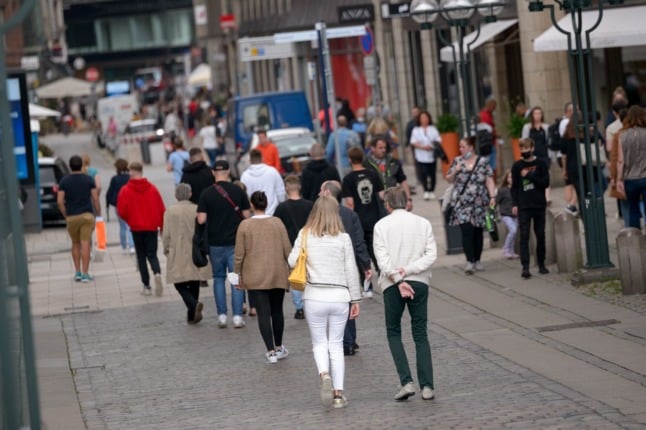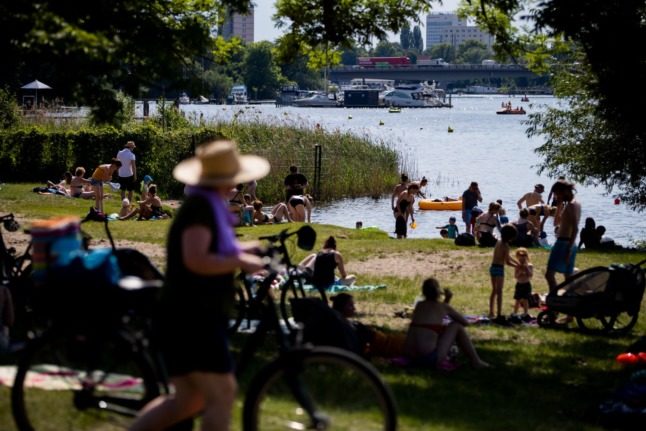Is trendy city living really out of fashion?
Perhaps. After months of being cooked up in flats and public life shut down due to Covid restrictions, a new study shows a growing number of people in Germany want to move to the suburbs or the commuter belt – known as the Speckgürtel (literally translated as the bacon belt or fat belt) in German.
A total of 13 percent of city dwellers would like to get out of the sprawling urban jungle within the next year, a joint analysis by the ifo Institute and real estate firm immowelt found.
“The corona pandemic has made many Germans rethink their housing situation,” said the firms. “More living space and access to nature are suddenly more in demand than lively city life in trendy neighbourhoods.”
But the representative study of 18,000 people showed that although many German residents want to change their living situation soon, they do not want to go without urban infrastructure altogether – signalling that the Speckgürtel is becoming ever more desirable.
Respondents showed that smaller cities and suburbs are particularly sought-after. These could be the likes of Potsdam near Berlin, Wiesbaden near Frankfurt or Ingolstadt near Munich and Nuremberg, but suburbs include smaller communities on the edge of cities with good travel links.
So despite the growing number of people looking for a higher quality of life outside the cities, there are no signs of a mass exodus to the country just yet.
READ ALSO: Where rents are rising (and falling) in Germany
But the ifo Institute and immowelt said their results “have implications for municipal infrastructure planning, for example in the areas of mobility and education”.
They say that better connections between suburban to urban areas “and an expansion of the educational infrastructure in suburban areas and in smaller metropolitan areas will grow in importance”.

Who is moving?
More space, lower rents and house prices, plus access to the great outdoors: life in the countryside or suburbs has a number of advantages over densely-packed urban areas.
And after workplaces were forced to bring in more flexible working agreements in the pandemic, people have been able to move from central areas without having long daily commutes.
The study shows that urban centres – cities with more than 500,000 residents – are clearly losing their appeal for some people.
READ ALSO: Are Germans really fleeing the city for an idyllic life in the countryside?
Age has a noticeable influence on who wants to get out to the country or suburbs. Of those aged 18 to 29, 18 percent plan on giving up their city residence in the next 12 months.
Meanwhile, 19 percent of 30 to 39-year-olds also have this plan. Moving away is less likely to be considered among 60 to 69-year-olds (11 percent) and those over 70 (5 percent).
Those who have children in the household are also more likely to think about their living conditions. Only 10 percent of childfree city dwellers plan to move out of the city within the next 12 months.
But for those with one child, the figure rises to 18 percent, and for parents with two or more children it doubles to 22 percent. Young people starting families are also increasingly planning to leave the urban area.
A survey the Local reported on in February showed that almost 30 percent of young professionals would consider moving to the countryside if they could stay in home office once the pandemic is over.
The experiences and consequences of the Covid pandemic shaped the decision-making process for lots of people. Germany had tough contact restrictions in place for months in 2020 and 2021, meaning people spent a lot of time indoors unable to meet with others, go to a restaurant or enjoy culture – the usual big draws for city living.
READ ALSO: How many people in Germany commute to another federal state for work?
Those who want to move in the short or medium term said the Covid crisis was a massive factor: almost every second respondent who wants to change their housing situation within the next 12 months said that the pandemic had an influence on the decision, said the study.
For those with a longer-term relocation plan, the pandemic plays a less significant role.

What are the other big reasons for moving?
For the people who want to turn their back on city life (at least for now) the main reasons are to get a larger apartment or living space, and the chance to have their own garden.
Almost two-thirds of the city dwellers surveyed said they wanted to be closer to the great outdoors, and to improve their living conditions.
Other frequently cited reasons were disruptive factors at their current home (58 percent), the desire for more living space (57 percent) and a better environment for the family (56 percent).
READ ALSO: Home Office makes employees more effective and happy, Germany study finds
Nature – yes, but with urban infrastructure
Despite all of this, there are no signs of a major urban exodus in Germany. In fact most city dwellers are not looking for a secluded spot in the countryside.
Those planning a short or long-term move away from the big city would prefer to move to a smaller city (38 percent) on the Speckgürtel. A further 30 percent want to stay in the suburbs.
Only 11 percent of the city dwellers surveyed plan to move to the countryside.
Suburban areas and cities with between 100,000 and 500,000 residents are therefore increasingly attracting the attention of the urban population.
These areas can offer a better living situation due to them being less densely packed with housing, but at the same time offer the advantages of an urban infrastructure and quick access to urban centres.




 Please whitelist us to continue reading.
Please whitelist us to continue reading.
Member comments